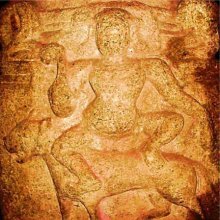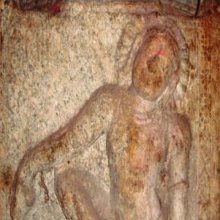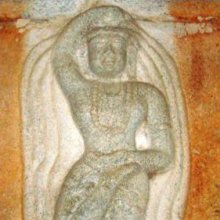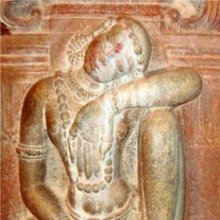Avani, Avanī, Avaṉi: 27 definitions
Introduction:
Avani means something in Buddhism, Pali, Hinduism, Sanskrit, Jainism, Prakrit, the history of ancient India, Marathi, Hindi, Tamil. If you want to know the exact meaning, history, etymology or English translation of this term then check out the descriptions on this page. Add your comment or reference to a book if you want to contribute to this summary article.
Images (photo gallery)
(+1 more images available)
In Hinduism
Ayurveda (science of life)
Nighantu (Synonyms and Characteristics of Drugs and technical terms)
Source: Wisdom Library: Raj NighantuAvanī (अवनी) or Avani refers to “earth” and is mentioned in a list of 53 synonyms for dharaṇi (“earth”), according to the second chapter (dharaṇyādi-varga) of the 13th-century Raj Nighantu or Rājanighaṇṭu (an Ayurvedic encyclopedia). The Dharaṇyādi-varga covers the lands, soil [viz., Avanī], mountains, jungles and vegetation’s relations between trees and plants and substances, with their various kinds.
Source: WorldCat: Rāj nighaṇṭuAvanī (अवनी) is another name for Trāyamāṇā, a medicinal plant identified with Gentiana kurroo Royle. from the Gentianaceae family of flowering plants, according to verse 5.57-59 of the 13th-century Raj Nighantu or Rājanighaṇṭu. The fifth chapter (parpaṭādi-varga) of this book enumerates sixty varieties of smaller plants (kṣudra-kṣupa). Together with the names Avanī and Trāyamāṇā, there are a total of sixteen Sanskrit synonyms identified for this plant.

Āyurveda (आयुर्वेद, ayurveda) is a branch of Indian science dealing with medicine, herbalism, taxology, anatomy, surgery, alchemy and related topics. Traditional practice of Āyurveda in ancient India dates back to at least the first millenium BC. Literature is commonly written in Sanskrit using various poetic metres.
Vastushastra (architecture)
Source: OpenEdition books: Architectural terms contained in Ajitāgama and RauravāgamaAvani (अवनि) refers to “lower band (molding) § 3.5.”.—(For paragraphs cf. Les enseignements architecturaux de l'Ajitāgama et du Rauravāgama by Bruno Dagens)

Vastushastra (वास्तुशास्त्र, vāstuśāstra) refers to the ancient Indian science (shastra) of architecture (vastu), dealing with topics such architecture, sculpture, town-building, fort building and various other constructions. Vastu also deals with the philosophy of the architectural relation with the cosmic universe.
Pancaratra (worship of Nārāyaṇa)
Source: University of Vienna: Sudarśana's Worship at the Royal Court According to the AhirbudhnyasaṃhitāAvanī (अवनी) refers to the “earth”, according to the Ahirbudhnyasaṃhitā, belonging to the Pāñcarātra tradition which deals with theology, rituals, iconography, narrative mythology and others.—Accordingly, “Then he shall obtain land extending as far as the whole earth with [all of its] cities. Siddhas, Gandharvas and Dānavas will be subdued forever. On earth (avanītala—pālayatyavanītale) he will rule over the entire realm of the Three Worlds. [...]”.

Pancaratra (पाञ्चरात्र, pāñcarātra) represents a tradition of Hinduism where Narayana is revered and worshipped. Closeley related to Vaishnavism, the Pancaratra literature includes various Agamas and tantras incorporating many Vaishnava philosophies.
In Buddhism
Tibetan Buddhism (Vajrayana or tantric Buddhism)
Source: OSU Press: Cakrasamvara SamadhiAvanī (अवनी) refers to the “earth element”, according to the Guru Mandala Worship (maṇḍalārcana) ritual often performed in combination with the Cakrasaṃvara Samādhi, which refers to the primary pūjā and sādhanā practice of Newah Mahāyāna-Vajrayāna Buddhists in Nepal.—Accordingly, “Oṃ in the middle of mantra inhabited ground, arisen of the four seeds, yaṃ, etc., a maṇḍala of the great elements, wind, fire, water, and earth [e.g., avanī—mahābhūtaṃ vāyvagnijalāvanimaṇḍalopari], Above that, (arising from) the letter suṃ, is the merumaṇḍala, Above that, on a jeweled lion-throne, lotus, and a lunar-disc, Śrī Vajrasattva, two arms, one face, white color, Holding a vajra (and) vajra-bell, (and) adorned wearing various colors, Bearing a monk’s headdress, (and) a sapphire Akṣobhya adorned crown, Thus imagine the worshipful guru[...]”.
Source: MDPI Books: The Ocean of HeroesAvani (अवनि) refers to the “ground”, according to the 10th-century Ḍākārṇava-tantra: one of the last Tibetan Tantric scriptures belonging to the Buddhist Saṃvara tradition consisting of 51 chapters.—Accordingly: [while explaining the body circle (kāyacakra)]: “[...] There are also other females [who are] headless and running, headless and dancing, and legless and sleeping. [Some] have heads [in the shape] of beaks of a crow and other [birds]. They also dance with joy because of being in a great meditative state. This way, he should make lunar mansions and so on [placed] in the middle of the ground (avani-madhya). [They] should be known in [their] respective colors. Everyone has a vehicle. [...]”.

Tibetan Buddhism includes schools such as Nyingma, Kadampa, Kagyu and Gelug. Their primary canon of literature is divided in two broad categories: The Kangyur, which consists of Buddha’s words, and the Tengyur, which includes commentaries from various sources. Esotericism and tantra techniques (vajrayāna) are collected indepently.
In Jainism
General definition (in Jainism)
Source: The University of Sydney: A study of the Twelve ReflectionsAvanī (अवनी) refers to the “earth” [?], according to the Yaśastilaka Campū verse 2.215-216.—Accordingly, “The Self is by nature deathless and without any beginning, endowed with bliss and infinite power, and luminous and pure. The powerful flames of sinful Karma heat it, like mercury, after lodging it in the body. Under the intoxicating power of Karma, even a man of superior merit goes reeling down to unhappy births (bhava-avanī—aśubhāsu bhavāvanīṣu). Se [sic] let the wise, who know the cardinal difference between the body and the Self, strive for the bliss that is free from rebirth”.

Jainism is an Indian religion of Dharma whose doctrine revolves around harmlessness (ahimsa) towards every living being. The two major branches (Digambara and Svetambara) of Jainism stimulate self-control (or, shramana, ‘self-reliance’) and spiritual development through a path of peace for the soul to progess to the ultimate goal.
India history and geography
Source: Cologne Digital Sanskrit Dictionaries: Indian Epigraphical GlossaryAvanī.—(EI 7-1-2), ‘one’. (EI 3), a district. Note: avanī is defined in the “Indian epigraphical glossary” as it can be found on ancient inscriptions commonly written in Sanskrit, Prakrit or Dravidian languages.
Source: Shodhganga: Temples and cult of Sri Rama in Tamilnadu (history)Avani refers to the month in the Tamil tradition corresponding to the months August-September.—[The festivals of Avani are: Pancasamskara-maahotsava, Pancaratra Jayanti].—Festivals take place in all Tamil moths of the year, beginning with Cittirai (April-May) and ending with Pankuni (March-April).—The rules and regulations for daily offerings and the periodical festivals [viz., Avani] are laid down in the Agamas.
Source: Shodhganga: Siddha Cult in TamilnaduAvani refers to one of the various famous Siddha Centre distributed throughout South India and Tamil Nadu. The Siddha cult represents a Tantric philosophy that emerged from the combination of several elements found in traditions such as Shaivism (viz., Pashupata), Shaktism, Jainism, Tantric Buddhism (Vajrayana), etc. Both the Siddha and the Navanath cult (i.e., Nava-natha, ‘nine saints’) are popular in South India [viz., Avani] and Tamilnadu. A Siddha was an inspired seer belonging to the marginalized sections of society who dissolved their past karma and crushed the roots of future karma.

The history of India traces the identification of countries, villages, towns and other regions of India, as well as mythology, zoology, royal dynasties, rulers, tribes, local festivities and traditions and regional languages. Ancient India enjoyed religious freedom and encourages the path of Dharma, a concept common to Buddhism, Hinduism, and Jainism.
Languages of India and abroad
Pali-English dictionary
Source: BuddhaSasana: Concise Pali-English Dictionaryavani : (f.) the earth.
Source: Sutta: The Pali Text Society's Pali-English DictionaryAvani, (f.) (Vedic avani) bed or course of a river; earth, ground Dāvs. IV, 5. (Page 83)

Pali is the language of the Tipiṭaka, which is the sacred canon of Theravāda Buddhism and contains much of the Buddha’s speech. Closeley related to Sanskrit, both languages are used interchangeably between religions.
Marathi-English dictionary
Source: DDSA: The Molesworth Marathi and English Dictionaryavaṇī (अवणी).—These, as Konkani words, are better written with आ.
--- OR ---
avani (अवनि).—f S The terraqueous globe.
Source: DDSA: The Aryabhusan school dictionary, Marathi-Englishavani (अवनि).—f The earth.
Marathi is an Indo-European language having over 70 million native speakers people in (predominantly) Maharashtra India. Marathi, like many other Indo-Aryan languages, evolved from early forms of Prakrit, which itself is a subset of Sanskrit, one of the most ancient languages of the world.
Sanskrit dictionary
Source: DDSA: The practical Sanskrit-English dictionaryAvani (अवनि) or Avanī (अवनी).—f. [av-ani Uṇādi-sūtra 2.11]
1) The earth; often used at the end of comp. meaning 'ground', 'place'; काननावनौ (kānanāvanau) Daśakumāracarita 7,13; लीलावनौ (līlāvanau) place of recreation 25.
2) A finger (Nir.)
3) A river; सं यं स्तुभोऽ- वनयो न यन्ति (saṃ yaṃ stubho'- vanayo na yanti) Ṛgveda 1.19.
4) Course, bed of a river, अवनिंगत (avaniṃgata) a. fallen prostrate on the gound.
Derivable forms: avaniḥ (अवनिः).
--- OR ---
Avanī (अवनी).—1 P.
1) To lead or bring down, to push into; अश्वानपोऽवनीयमानान् (aśvānapo'vanīyamānān) Kāty.
2) To cause to descend or flow.
3) To lead away.
4) To pour down or over.
Source: Cologne Digital Sanskrit Dictionaries: Shabda-Sagara Sanskrit-English DictionaryAvani (अवनि).—f.
(-niḥ) The earth. E. ava to preserve, ani Unadi affix; it is also written avanī.
--- OR ---
Avanī (अवनी).—f. (-nī) The earth: see avani.
Source: Cologne Digital Sanskrit Dictionaries: Benfey Sanskrit-English DictionaryAvani (अवनि).—avanī, f. The earth, [Bhartṛhari, (ed. Bohlen.)] 2, 10; [Śiśupālavadha] 9, 20.
Avani can also be spelled as Avanī (अवनी).
Source: Cologne Digital Sanskrit Dictionaries: Cappeller Sanskrit-English DictionaryAvani (अवनि).—[feminine] bed or course of a river; river, stream; earth, ground, place (also nī† [feminine]).
--- OR ---
Avanī (अवनी).—lead down, push or put into ([accusative] or [locative]); pour down, off, or over.
Avanī is a Sanskrit compound consisting of the terms ava and nī (नी).
Source: Cologne Digital Sanskrit Dictionaries: Monier-Williams Sanskrit-English Dictionary1) Avanī (अवनी):—[from avana > av] a f. the plant Ficus Heterophylla, [cf. Lexicographers, esp. such as amarasiṃha, halāyudha, hemacandra, etc.]
2) [v.s. ...] Name of a river, [Harivaṃśa] (See avani.)
3) Avani (अवनि):—f. course, bed of a river, [Ṛg-veda]
4) stream, river, [Ṛg-veda], the earth, [Naighaṇṭuka, commented on by Yāska; Rāmāyaṇa; Pañcatantra] etc.
5) the soil, ground, [Meghadūta]
6) any place on the ground, [Sūryasiddhānta]
7) the fingers, [Naighaṇṭuka, commented on by Yāska]
8) Avanī (अवनी):—[from avani] 1. avanī f. the earth, [Rāmāyaṇa; Pañcatantra]
9) [=ava-nī] 2. ava-√nī ([future] 2. sg. -neṣyasi) to lead or bring down into (water), [Śatapatha-brāhmaṇa];
—to put into ([locative case]), [Gobhila-śrāddha-kalpa];—-nayati, [Vedic or Veda] to pour down or over, [Atharva-veda; Vājasaneyi-saṃhitā etc.]
Source: Cologne Digital Sanskrit Dictionaries: Yates Sanskrit-English Dictionary1) Avani (अवनि):—(niḥ) 2. f. The earth; keeping.
2) Avanī (अवनी):—(nī) 3. f. The earth.
Source: DDSA: Paia-sadda-mahannavo; a comprehensive Prakrit Hindi dictionary (S)Avani (अवनि) in the Sanskrit language is related to the Prakrit word: Avaṇi.
[Sanskrit to German]
Sanskrit, also spelled संस्कृतम् (saṃskṛtam), is an ancient language of India commonly seen as the grandmother of the Indo-European language family (even English!). Closely allied with Prakrit and Pali, Sanskrit is more exhaustive in both grammar and terms and has the most extensive collection of literature in the world, greatly surpassing its sister-languages Greek and Latin.
Hindi dictionary
Source: DDSA: A practical Hindi-English dictionaryAvani (अवनि):—(nf) the earth; ~[pati] a king, ruler.
...
Prakrit-English dictionary
Source: DDSA: Paia-sadda-mahannavo; a comprehensive Prakrit Hindi dictionary1) Avaṇi (अवणि) in the Prakrit language is related to the Sanskrit word: Avani.
2) Avaṇī (अवणी) also relates to the Sanskrit word: Apanī.
Prakrit is an ancient language closely associated with both Pali and Sanskrit. Jain literature is often composed in this language or sub-dialects, such as the Agamas and their commentaries which are written in Ardhamagadhi and Maharashtri Prakrit. The earliest extant texts can be dated to as early as the 4th century BCE although core portions might be older.
Kannada-English dictionary
Source: Alar: Kannada-English corpusAvani (ಅವನಿ):—
1) [noun] the earth.
2) [noun] the tree Murraya koenigii of Rutaceae family.
3) [noun] its leaf.
4) [noun] the tree Sesbania grandiflora of Papilionaceae family.
--- OR ---
Āvaṇi (ಆವಣಿ):—[noun] the fifth month in Tamil Calendar corresponding to the later part of fourth and the early part of fifth months of the lunar calendar.
Kannada is a Dravidian language (as opposed to the Indo-European language family) mainly spoken in the southwestern region of India.
See also (Relevant definitions)
Starts with (+56): Avani moola, Avani-randhra-nyaya, Avani-vetana, Avanibhaga, Avanibhartri, Avanibhrit, Avanicara, Avanichara, Avaniddaya, Avanideva, Avanidhara, Avanidhra, Avanidvija, Avaniga, Avanihsarana, Avanij, Avanija, Avanijapati, Avanijata, Avanije.
Ends with (+442): Abhavani, Abhishavani, Abhyavani, Adakavani, Adavani, Adhavani, Adhikaravani, Adibhavani, Adityavani, Agasavani, Agavani, Aggavani, Agghavani, Agnihotrahavani, Aikavani, Aiyavani, Akacavani, Akalavani, Akashavani, Alavani.
Full-text (+86): Avanipati, Avanipala, Avanisha, Avanimandala, Avaneya, Avanishvara, Avanibhrit, Avanidhra, Avanicara, Avanidhara, Avanimukha, Avaniruha, Avanimulakkam, Ghritavani, Karpparuvam, Vishnupatam, Vellaimanavari, Kuliyaticcan, Carappaliccampa, Vellaimilaki.
Relevant text
Search found 19 books and stories containing Avani, Avaṇī, Avanī, Ava-ni, Ava-nī, Avaṇi, Āvaṇi, Avaṉi; (plurals include: Avanis, Avaṇīs, Avanīs, nis, nīs, Avaṇis, Āvaṇis, Avaṉis). You can also click to the full overview containing English textual excerpts. Below are direct links for the most relevant articles:
Rig Veda (translation and commentary) (by H. H. Wilson)
Chaitanya Bhagavata (by Bhumipati Dāsa)
Verse 1.2.213 < [Chapter 2 - The Lord’s Appearance]
Temples of Munnur (Historical Study) (by R. Muthuraman)
Avani (Vinayaka Chaturti) (August - September) < [Chapter 6]
Kulottunga III (A.D.1178-1218 A.D.) < [Chapter 1]
Annual Festivals < [Chapter 6]
Preceptors of Advaita (by T. M. P. Mahadevan)
Early Chola Temples (by S. R. Balasubrahmanyam)
Table I. Agastyesvaram (with square sikhara) < [Chapter XIII - Prasada: Component Parts]
Garbhagriha < [Chapter XIII - Prasada: Component Parts]
Table II. Cholisvaram (with circular sikhara) < [Chapter XIII - Prasada: Component Parts]
Puranic encyclopaedia (by Vettam Mani)





